Champaign-Urbana is a town fraught in a literary tradition all its own. Sure, if asked to compile a list of top ten literary cities, C-U wouldn’t make many lists, but that doesn’t keep it from having a unique flavor. The books included on this list are the tip of our literary iceberg — they do not by any means represent a comprehensive picture of C-U’s literary landscape over the past decade. Critical Theory, such as Michael Rothberg’s Multidirecional Memory or Cary Nelson’s wide catalogue of work, was not considered, nor was the massive amount of academically-oriented literature that is produced by the hordes of academics who’ve taken up residence here in C-U. Even still, a great deal of work is not included on this list, not because it doesn’t belong here, but because, for one reason or another, it did not tickle our collective editorial fancy. So read on, and when you’re done, make sure to tell us what we got wrong, what we got right and what we forgot!
Let’s start with a token honorable mention – a nod to our very own William Gillespie.
2002: A Palindrome Story in 2002 Words,
by Nick Montfort, William Gillespie, illus. Shelly Jackson. Spineless, 2002. 24 pp.
The book that launched Spineless Books, 2002 is more an impressive 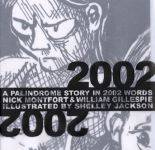 accomplishment than anything. The entire book is a palindrome, and although the storytelling suffers some from the repressive structure (Word of the Day: Oulipian!), just the fact that they’re able to tell any kind of coherent story is amazing in itself. The illustrations are gorgeous, as well. Read a journal article excerpt here. — Joel Gillespie
accomplishment than anything. The entire book is a palindrome, and although the storytelling suffers some from the repressive structure (Word of the Day: Oulipian!), just the fact that they’re able to tell any kind of coherent story is amazing in itself. The illustrations are gorgeous, as well. Read a journal article excerpt here. — Joel Gillespie
––––––
10. The Problem of the Media: U.S. Communication Politics in the 21st Century,
by Robert McChesney. Monthly Review Press, 2004. 352 pp.
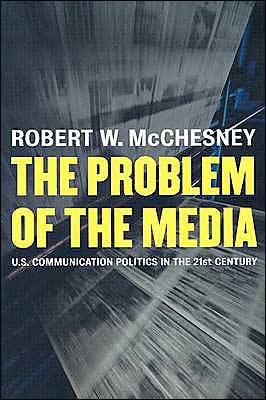 After publishing Rich Media, Poor Democracy (University of Illinois Press, 1999 and The New Press, 1999) Robert McChesney announced his arrival as a major voice in media studies. 2004’s The Problem of the Media succinctly follows up on many of the ideas he had previously only begun to broach, such as the degradation of hard news and the rise of infotainment that more and more has come to mark the modern American news media. McChesney is a professor at the U of I and the founder of Media Matters. God only knows what he’d say if he read Smile Politely. — Caleb Curtiss
After publishing Rich Media, Poor Democracy (University of Illinois Press, 1999 and The New Press, 1999) Robert McChesney announced his arrival as a major voice in media studies. 2004’s The Problem of the Media succinctly follows up on many of the ideas he had previously only begun to broach, such as the degradation of hard news and the rise of infotainment that more and more has come to mark the modern American news media. McChesney is a professor at the U of I and the founder of Media Matters. God only knows what he’d say if he read Smile Politely. — Caleb Curtiss
––––––
9. The Earwig’s Tail: A Modern Bestiary of Multi-Legged Legends,
May Berenbaum. Harvard University Press, 2009. 216 pp.
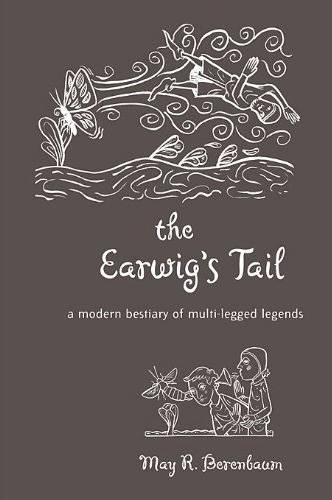 If you haven’t ever heard of May Berenbaum, don’t feel too badly; after all, she writes about things that you general try to avoid at all costs. Believe it or not, but C-U is home to arguably the most important author in the field of entymology in the whole world. How famous is she? Well, let’s just say that the people who created X-Files have a soft spot for her work. The Earwig’s Tail, like all of her books, is written so splendidly that you immediately forget that you are reading something scientific enough to include the Latin names of these creepy, crawly subject matters. In the book, she dispels urban myths, questions the validity of insect fear-mongering and leaves her audience with enough to chew on that we’d be lucky to have those sharp mandibles to gnaw through it all. — Seth Fein
If you haven’t ever heard of May Berenbaum, don’t feel too badly; after all, she writes about things that you general try to avoid at all costs. Believe it or not, but C-U is home to arguably the most important author in the field of entymology in the whole world. How famous is she? Well, let’s just say that the people who created X-Files have a soft spot for her work. The Earwig’s Tail, like all of her books, is written so splendidly that you immediately forget that you are reading something scientific enough to include the Latin names of these creepy, crawly subject matters. In the book, she dispels urban myths, questions the validity of insect fear-mongering and leaves her audience with enough to chew on that we’d be lucky to have those sharp mandibles to gnaw through it all. — Seth Fein
––––––
8. The Chicken Chasing Queen of Lamar County,
by Janice N. Harrington, illus. Shelly Jackson. 2007. 40 pp.
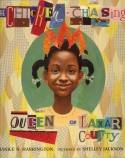 Winner of numerous awards, including Time Magazines Top 10 Children’s Books of 2007 (7), this Oprah Book Club book is playful, colorful and poetic. Your kids might like it too. Harrington – whose book of poetry Even the Hollow My Body Made is Gone (BOA Editions, 2007) could just as easily be on this list — explores many of the same themes that her poetry does in this tale of personal maturity. Indeed, where Harrington’s poetry ends and her Children’s Writing begins is uncertain. The lines that Harrington describes the chicken her young protagonist longs to catch are the ones that most hearken to her verse: its feathers “shiny as a rained on roof,” its clucking like “pennies falling on a dinner plate.” Harrington’s work here is a pleasure for all. — Caleb Curtiss
Winner of numerous awards, including Time Magazines Top 10 Children’s Books of 2007 (7), this Oprah Book Club book is playful, colorful and poetic. Your kids might like it too. Harrington – whose book of poetry Even the Hollow My Body Made is Gone (BOA Editions, 2007) could just as easily be on this list — explores many of the same themes that her poetry does in this tale of personal maturity. Indeed, where Harrington’s poetry ends and her Children’s Writing begins is uncertain. The lines that Harrington describes the chicken her young protagonist longs to catch are the ones that most hearken to her verse: its feathers “shiny as a rained on roof,” its clucking like “pennies falling on a dinner plate.” Harrington’s work here is a pleasure for all. — Caleb Curtiss
––––––
7. Your Movie Sucks,
by Roger Ebert. Andrews McMeel Publishing, 2007. 368 pp.
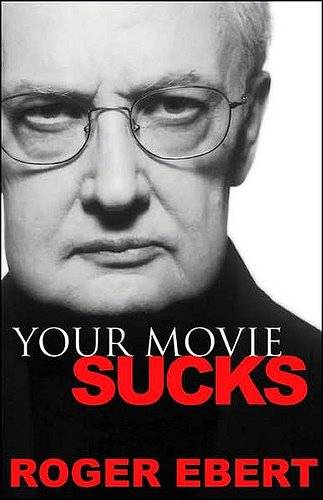 A list of local books cannot be complete without one of Ebert’s. One of Urbana’s most famous and most favorite sons, Ebert is perhaps best as a writer not when he’s raving, but when he’s roaring — which is all he does in Your Movie Sucks, a compilation of two-star-or-less-reviews. Nobody, and I mean nobody, can dress down a bad flick like this guy. Whether or not I like the movie is besides the point, his observations and exclamations are about as entertaining as anything out there. But really folks, what more can I say about the guy that doesn’t already get said (ad naseum) at Ebertfest each year? — Caleb Curtiss
A list of local books cannot be complete without one of Ebert’s. One of Urbana’s most famous and most favorite sons, Ebert is perhaps best as a writer not when he’s raving, but when he’s roaring — which is all he does in Your Movie Sucks, a compilation of two-star-or-less-reviews. Nobody, and I mean nobody, can dress down a bad flick like this guy. Whether or not I like the movie is besides the point, his observations and exclamations are about as entertaining as anything out there. But really folks, what more can I say about the guy that doesn’t already get said (ad naseum) at Ebertfest each year? — Caleb Curtiss
––––––
6. Throw Like a Girl,
Jean Thompson. Simon & Schuster, 2007. 291 pp.
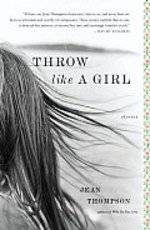 Don’t be mistaken by its title. Thompson takes us into the world of girls, and it’s not the dainty, empowering, optimistic narrative you might be hoping from a title like this one. Perhaps its short stories are even too honest for some to swallow. But if you’re willing to give it a chance, this book is a reflection of the sometimes disturbing reality that these all too real women that we may know or pass on the street. To scoff at the notion that these women exist, is to be in denial. — Justine Fein-Bursoni
Don’t be mistaken by its title. Thompson takes us into the world of girls, and it’s not the dainty, empowering, optimistic narrative you might be hoping from a title like this one. Perhaps its short stories are even too honest for some to swallow. But if you’re willing to give it a chance, this book is a reflection of the sometimes disturbing reality that these all too real women that we may know or pass on the street. To scoff at the notion that these women exist, is to be in denial. — Justine Fein-Bursoni
––––––
5. In the Black Window: New and Selected Poems,
by Michael Van Walleghen. University of Illinois Press, 2004. pp.
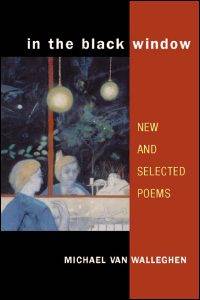 Perhaps one of the most underrated poets of his generation, Michael Van Walleghen’s catalogue goes back to the 1975 publication of The Wichita Poems and crescendos with the highly formal and at times starkly personal More Trouble with the Obvious. By grouping his selected work with the new poems in In the Black Window it may seem as if Van Walleghen is inviting us to compare his old work with his new. He is not. Rather, by arranging the volume so his new poems are presented first, he is inviting us to see his old work in context of the new. This volume provides us with most of Van Walleghen’s best stuff which, like the “squeaking, wordless circles” of the young girl in “Fidelity,” invites us to understand something that we cannot, and then to grieve for it. — Caleb Curtiss
Perhaps one of the most underrated poets of his generation, Michael Van Walleghen’s catalogue goes back to the 1975 publication of The Wichita Poems and crescendos with the highly formal and at times starkly personal More Trouble with the Obvious. By grouping his selected work with the new poems in In the Black Window it may seem as if Van Walleghen is inviting us to compare his old work with his new. He is not. Rather, by arranging the volume so his new poems are presented first, he is inviting us to see his old work in context of the new. This volume provides us with most of Van Walleghen’s best stuff which, like the “squeaking, wordless circles” of the young girl in “Fidelity,” invites us to understand something that we cannot, and then to grieve for it. — Caleb Curtiss
––––––
4. The Age of Lincoln,
Orville Vernon Burton. Hill & Wang, 2009. 432 pp.
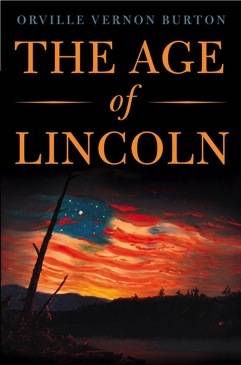 In some ways this book can be seen as Vernon Burton’s aubade to Illinois. Though he is still intrinsically tied to our community and our campus, Burton left town for his native South Carolina shortly after publishing The Age of Lincoln. The title of the book, which nods to Arthur Schlesinger Jr.’s The Age of Jackson, sums up Burton’s angle in that he veers away from adulating the Great President, focusing instead upon the moment in history he came to define. Part historical account, part meditation on loss, freedom and democracy, The Age of Lincoln is an important and enjoyable read. — Caleb Curtiss
In some ways this book can be seen as Vernon Burton’s aubade to Illinois. Though he is still intrinsically tied to our community and our campus, Burton left town for his native South Carolina shortly after publishing The Age of Lincoln. The title of the book, which nods to Arthur Schlesinger Jr.’s The Age of Jackson, sums up Burton’s angle in that he veers away from adulating the Great President, focusing instead upon the moment in history he came to define. Part historical account, part meditation on loss, freedom and democracy, The Age of Lincoln is an important and enjoyable read. — Caleb Curtiss
––––––
3. Consider the Lobster and Other Essays,
by David Foster Wallace. Little, Brown, 2005. 353 pp.
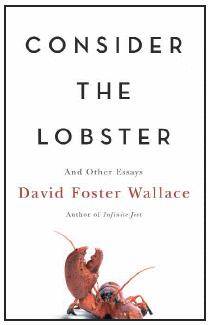 My strongest memory of this book is settling down with a copy in the Elliott Bay Book Company in Seattle (I was visiting my brother) and tearing through “Big Red Son.” Maybe it doesn’t seem necessary to spend 50 pages proving that the adult film industry is filled with the stupidest people you can imagine, but it sure was worth it to me. Just a colossal talent, able to write engagingly (or completely obtusely) on almost any topic. In this volume alone, he ran the gamut from politics to grammar, Updike to Dostoevsky, low culture to high — always inquisitive and yet assured. — Joel Gillespie
My strongest memory of this book is settling down with a copy in the Elliott Bay Book Company in Seattle (I was visiting my brother) and tearing through “Big Red Son.” Maybe it doesn’t seem necessary to spend 50 pages proving that the adult film industry is filled with the stupidest people you can imagine, but it sure was worth it to me. Just a colossal talent, able to write engagingly (or completely obtusely) on almost any topic. In this volume alone, he ran the gamut from politics to grammar, Updike to Dostoevsky, low culture to high — always inquisitive and yet assured. — Joel Gillespie
––––––
2. Poems: Song and The Orchard,
by Brigit Pegeen Kelly. Carcanet Press, 2008. 150 pp.
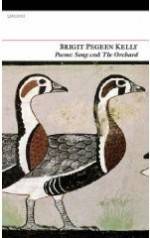 A local poet and U of I English professor, Brigit Pegeen Kelly has enjoyed a career paved with highly prestigious awards and honors. Her 1987 debut, To The Place of Trumpets was selected by James Merrill for the Yale Series of Younger Poets, and can be found for sale on Amazon for a small fortune. Thankfully, her two more recent books are still in print and can be found in one volume for much less. Song (BOA, 1995), the American Academy of Poet’s selection for 1994’s Lamont prize, and The Orchard (BOA, 2004), finalist for the Pulitzer, both represent a uniquely significant contribution to the world of arts and letters. One of the most influential poets of her generation, Kelly has consistently created work that defies the generalities that might define it by exploring the ironies of what it is to be human. Frankly, by putting Kelly on this list, I’ve exposed my shortcomings as both a reader and a writer, so I’ll cop out and let the poet Carl Phillips do the talking.
A local poet and U of I English professor, Brigit Pegeen Kelly has enjoyed a career paved with highly prestigious awards and honors. Her 1987 debut, To The Place of Trumpets was selected by James Merrill for the Yale Series of Younger Poets, and can be found for sale on Amazon for a small fortune. Thankfully, her two more recent books are still in print and can be found in one volume for much less. Song (BOA, 1995), the American Academy of Poet’s selection for 1994’s Lamont prize, and The Orchard (BOA, 2004), finalist for the Pulitzer, both represent a uniquely significant contribution to the world of arts and letters. One of the most influential poets of her generation, Kelly has consistently created work that defies the generalities that might define it by exploring the ironies of what it is to be human. Frankly, by putting Kelly on this list, I’ve exposed my shortcomings as both a reader and a writer, so I’ll cop out and let the poet Carl Phillips do the talking.
From his essay published in honor of Kelly’s 2008 Academy of American Poet’s Fellowship: To persuade the reader, poem after poem, that the surreal is no less real than what we call the real, to argue for — successfully — something akin to spiritual vision side by side with the more common suspicion of anything but the cold hard facts-this requires a rare authority, at the level of intellect, to be sure, but also in terms of language and, especially evident in Kelly’s work, sheer beauty. Kelly has created a poem that often purports to be narrative, but turns out to work like a secular version of John Donne‘s sermons, crossed perhaps with the deliberately misleading innocence of, say, the Elizabeth Bishop of “At the Fishhouses,” where she effortlessly shifts from singing Baptist hymns to a seal, to a grand vision of knowledge as historical, flowing, and flown.
This book could just as easily be number one on this list. — Caleb Curtiss
––––––
1. The Echo Maker,
by Richard Powers. Farrar, Straus & Giroux, 2006. 464 pp.
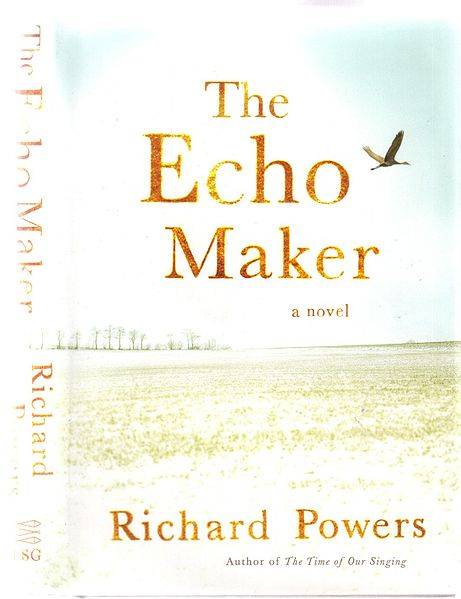 Don’t act surprised — you knew this was coming. Winner of the 2006 National Book Award for Fiction and finalist for the Pulitzer, The Echo Maker is by far the most lauded and well-recognized literary achievement that a C-U author (a presumptuous distinction to say the least) has ever produced. Whether or not it’s the best of Powers’ now ten novels, is frankly debatable. Indeed, its selection for the National Book Award seemed more a recognition of Powers’ sustained accomplishments for novels such as Three Farmers on Their Way to a Dance, Galatea 2.2 and The Time of Our Singing. The Echo Maker‘s wide appeal/recognition is not entirely arbitrary as it represents a more character driven, reader friendly apparatus for Powers’ big ideas.
Don’t act surprised — you knew this was coming. Winner of the 2006 National Book Award for Fiction and finalist for the Pulitzer, The Echo Maker is by far the most lauded and well-recognized literary achievement that a C-U author (a presumptuous distinction to say the least) has ever produced. Whether or not it’s the best of Powers’ now ten novels, is frankly debatable. Indeed, its selection for the National Book Award seemed more a recognition of Powers’ sustained accomplishments for novels such as Three Farmers on Their Way to a Dance, Galatea 2.2 and The Time of Our Singing. The Echo Maker‘s wide appeal/recognition is not entirely arbitrary as it represents a more character driven, reader friendly apparatus for Powers’ big ideas.
In a style which has come to be closely identified with Powers’ work, the novel skips around from perspective to perspective as it tells the story of Mark Schutler, a wily young man who suffers a traumatic brain injury when he flips his truck on a razor sharp Nebraska road. As he slowly begins to awaken, he struggles to reconnect the disparate strands of his unraveled brain. Soon it becomes clear that something is terribly wrong with him. Perhaps at his strongest when relating Schutler’s brain damaged perspective in short and abstract chapters that read almost like long prose poems, Powers has created a narrative nearly capable of supporting the complexity of his vision. — Caleb Curtiss








